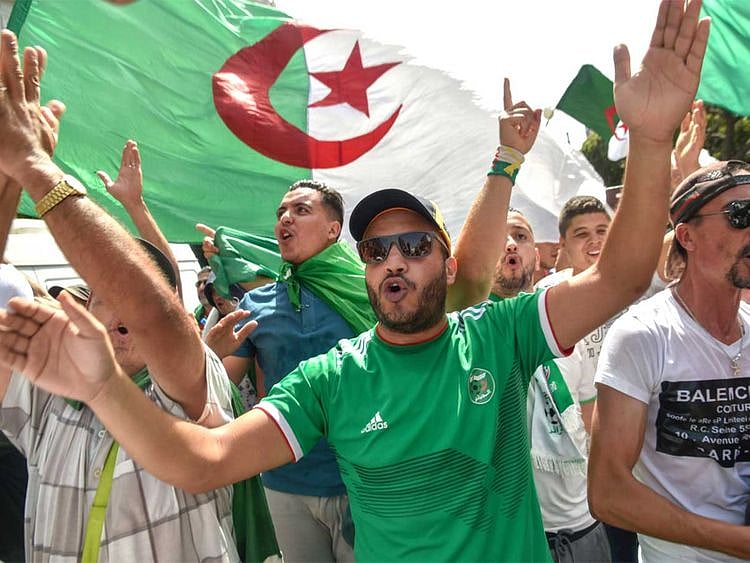Algerians clamouring for democratic freedoms and greater economic opportunity have massively and peacefully rallied on the streets of the capital and most other cities each Friday for 26 consecutive weeks. Their initial calls to unseat their elderly and ailing president who intended to run for a fifth term were resisted but eventually acted upon. The atmosphere continues to be carnival-like but as each week passes, the chance of widespread violence and civil disobedience looms.
A proud and hospitable people, the Algerians have never been short of courage. I know because I was privileged to work in this incredibly diverse and beautiful country during the mid-1970s that could be a magnet for tourists if serial regimes were not so entrenched in an insular mindset. A failure to diversify away from oil and gas whose revenue fluctuates and to ease foreign investment have taken a toll on state coffers.
Protesters won’t give up on their hopes without a fight and as someone who lived in the region during the 2011 mass uprisings that brought about such devastation, I struggle to be optimistic. People’s hunger for change is valid but rarely assuaged. In this case, Algeria’s faltering economy is in the balance. Moreover, the chances of productive negotiations to resolve the impasse are dim. What began as a grassroots movement is without a representative leadership.
On April 2, Abdelaziz Bouteflika was forced to step down on the orders of the military and was replaced by one of his closest allies President Abdelkader Bensalah in a caretaker role. Regime officials and elite businessmen suspected of corrupt practices have been arrested.
Elections scheduled for July 4 were cancelled by the country’s Constitutional Council that considered the only two candidates unsuitable and were also rejected by the majority of Algerians fearing the ballot would be rigged. Bensalah still holds the reins even though his 90-day mandate has expired.
However, now that the angry chanting crowds have tasted a modicum of success, their demands have expanded exponentially to what may be unrealistic if not dangerous heights that pit the people against Algeria’s powerful army which considers itself as the saviour and protector of the state. That conviction has a kernel of truth.
Bloody 10-year war
During a bloody ten-year-long war (1991-2002) the military battled to prevent the nation’s take over by Islamist rebels coalesced under the Islamic Salvation Army (ALS) responsible for robbing up to 200,000 of their lives. Terrorists committed massacres of men, women and children. Normal daily life was put on hold.
People everywhere were fearful of venturing out after dark. Overwhelmed, the rebels announced a unilateral ceasefire; many were given amnesty. Suffused with relief and gratitude, Algerians lent their support to a pro-military party and credited the then newly-elected Bouteflika for delivering peace and security to their ravaged land.
Memories are short. The country’s youth, in particular, were not directly impacted by the darkest period since Algeria’s War of Liberation against the occupying French power; most were young children or were yet to be born. In many eyes, the army has descended from hero to zero.
Echoing the calls of demonstrators in Sudan, Algerians holding up banners reading “A republic not a military barrack” are demanding a civilian government unencumbered by military diktats and cleansed from any vestiges of the old guard, including President Bensalah and Prime Minister Noureddine Bedoui. In truth the army is and always will be the hand that rocks Algeria’s cradle no matter what political facade is created.
General-Director of the Armed Forces Gaid Salah accuses “those with grudges and animosity towards the army and its command are undoubtedly enemies of Algeria” and warns protesters to quit their “unrealistic slogans aimed at destroying the institutions of the state”. So far the military’s higher echelons stand with him.
An ominous warning
Having learned from the playbook of 2011 revolutionaries, demonstrators seek to split the lower ranks from the generals with emotive appeals and the offerings of roses but to quote an ominous warning from former Prime Minister Ahmed Ouyahia, “We should remember Syria also began with roses”.
Will the public euphoria and self-empowerment turn to tears or will the military bend or at least give the appearance of bending to the will of the people? Only time will tell.
— Linda S. Heard is an award-winning British political columnist and guest television commentator with a focus on the Middle East.
Sign up for the Daily Briefing
Get the latest news and updates straight to your inbox
Network Links
GN StoreDownload our app
© Al Nisr Publishing LLC 2026. All rights reserved.
